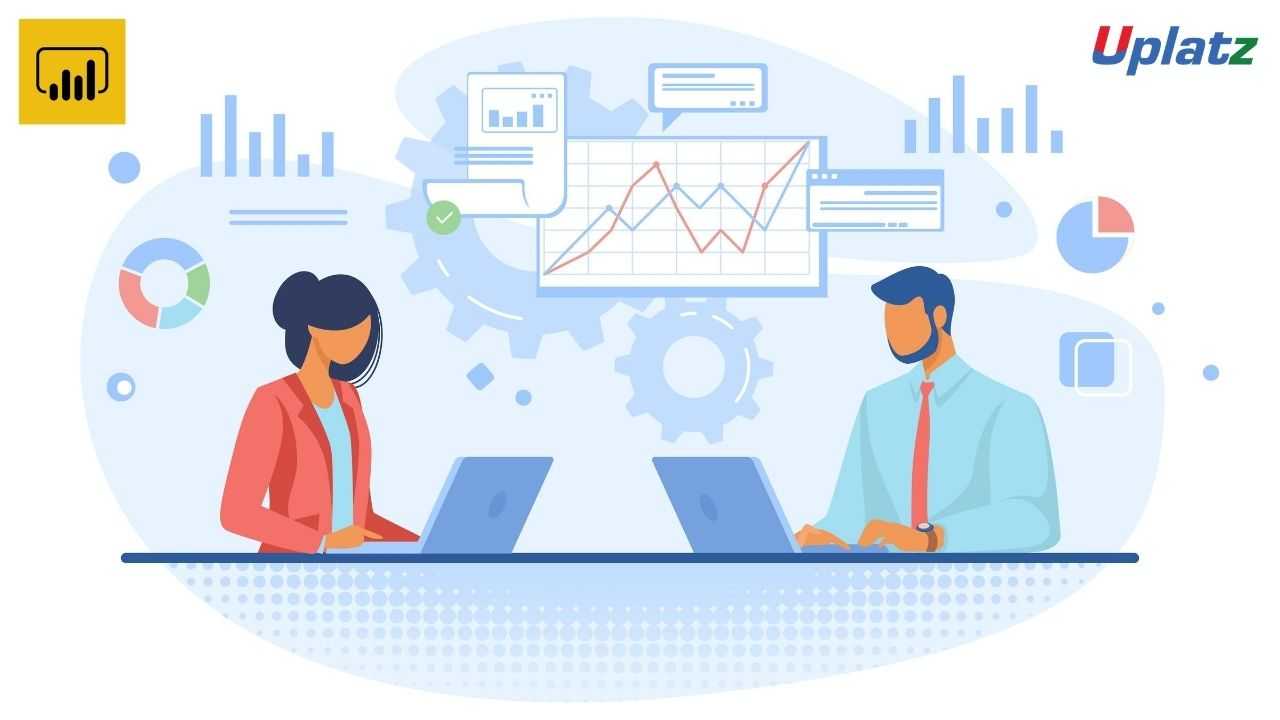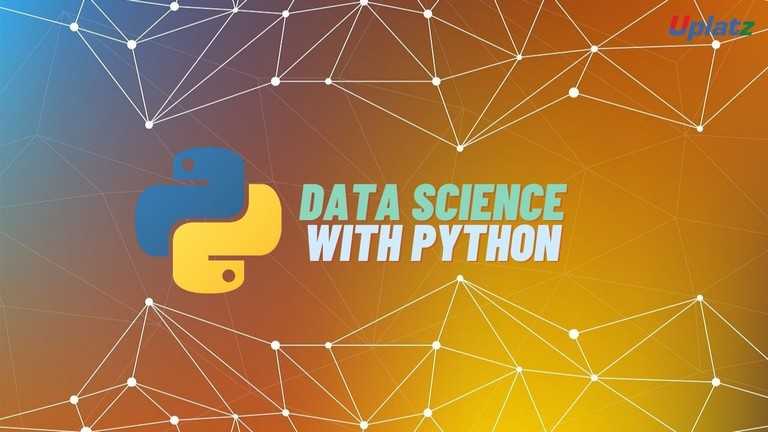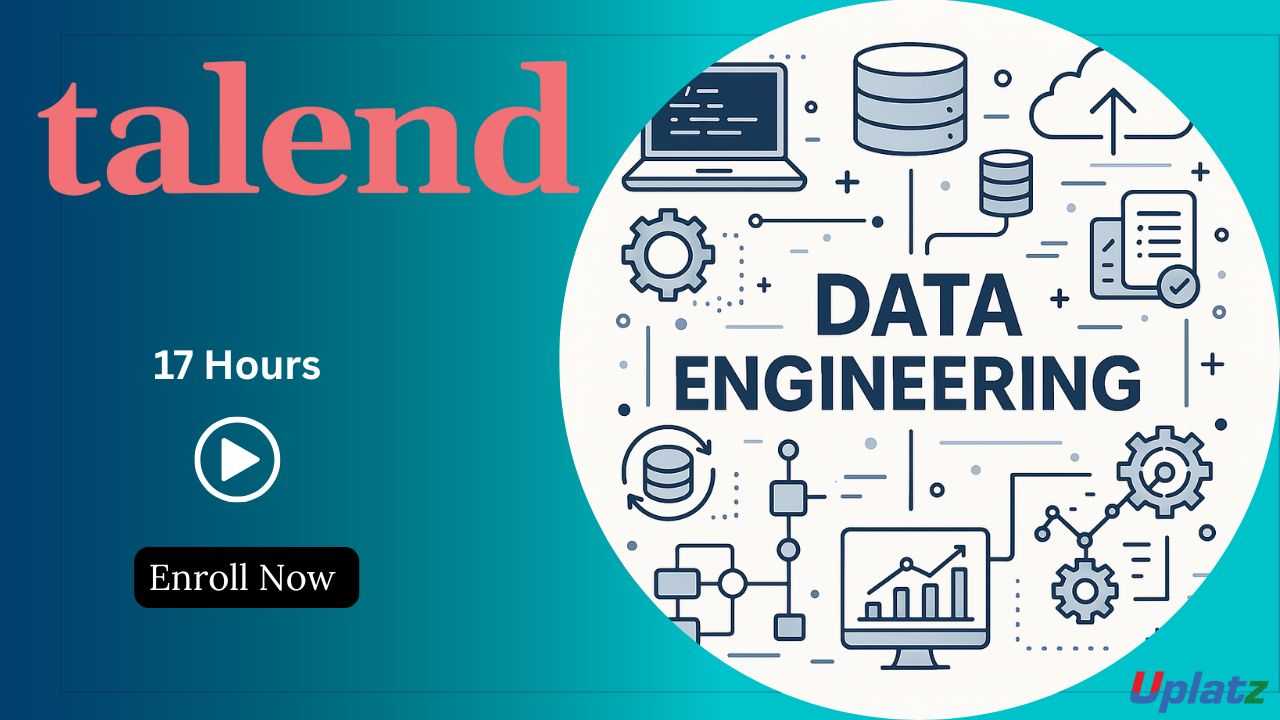Microsoft Power BI Data Analyst
Master Power BI and Microsoft Power Platform tools to analyze, visualize, and deploy data solutions aligned with PL-300 certification goals.Preview Microsoft Power BI Data Analyst course
Price Match Guarantee Full Lifetime Access Access on any Device Technical Support Secure Checkout Course Completion Certificate 96% Started a new career
BUY THIS COURSE (
96% Started a new career
BUY THIS COURSE (GBP 12 GBP 29 )-
 89% Got a pay increase and promotion
89% Got a pay increase and promotion
Students also bought -
-

- Power BI (basic to advanced)
- 30 Hours
- GBP 12
- 186 Learners
-

- Data Science with Python
- 45 Hours
- GBP 12
- 2931 Learners
-

- Data Engineering with Talend
- 17 Hours
- GBP 12
- 540 Learners

Microsoft Power BI Data Analyst: PL-300 Exam Preparation – Self-Paced Online Course
Microsoft Power BI Data Analyst is a comprehensive, hands-on training program created for individuals seeking to become certified data analysts and power users of Microsoft’s powerful business intelligence tools. Whether you're an aspiring data analyst, a business user transitioning into a data role, or a seasoned professional looking to validate your skills with the PL-300 certification, this course is your strategic learning companion.
In today's data-driven world, business decisions are increasingly reliant on accurate, timely insights derived from large volumes of complex data. Microsoft Power BI is one of the most widely used tools for data visualization, analysis, and business intelligence. This course not only prepares you to pass the PL-300 certification exam confidently but also equips you with the real-world skills needed to succeed in professional environments where data modeling, analysis, and storytelling are essential.
What You Will Learn
This course is meticulously designed to help you master the key skills measured by the PL-300: Microsoft Power BI Data Analyst exam. You will begin by learning how to prepare data for analysis, including importing, transforming, and cleaning data from various sources using Power Query and Dataflows. Then, you'll move into building efficient data models with DAX (Data Analysis Expressions), defining calculated columns, and optimizing performance for large datasets.
From there, you'll explore how to create interactive visual reports and dashboards using Power BI Desktop, the Power BI Service, and Power BI Mobile. You’ll learn not just how to build visuals, but how to communicate insights effectively through compelling data storytelling and report design best practices.
To broaden your understanding of the Microsoft Power Platform ecosystem, this course also introduces Power Automate and Power Apps, allowing you to automate workflows and create low-code apps that integrate with Power BI. You'll also get a foundational look at Microsoft Fabric, Microsoft's next-generation data platform, offering a unified data solution for enterprises.
Through expert-led instruction, real-world projects, quizzes, and hands-on labs, you’ll gain practical, job-ready experience that mirrors what’s expected of a Power BI Data Analyst in any organization.
Who Should Take This Course
This course is ideal for:
- Aspiring data analysts and business intelligence professionals
- Business users who want to leverage Power BI for deeper insights
- Excel users transitioning into more powerful data tools
- Professionals preparing to take the PL-300 exam
- Data professionals looking to sharpen their modeling, reporting, and DAX skills
- Students or career changers entering the field of data analytics
Whether you’re new to Power BI or have some experience with business data tools, this course supports learners at multiple levels by starting with core concepts and scaling up to advanced techniques.
Course Format and Delivery
Delivered in a self-paced, online format, this course offers the flexibility to learn at your own speed, wherever you are. All content is available on-demand and structured into well-organized modules that align directly with the official PL-300 exam objectives. Each module includes:
- High-quality video tutorials with demonstrations
- Downloadable Power BI datasets and project files for hands-on practice
- Knowledge checks and quizzes after every topic to reinforce learning
- Capstone projects based on real business scenarios
- Interactive labs and simulations to mirror workplace applications
- Lifetime access to all content, including future updates
Additionally, the course includes guidance on exam registration, study strategy, and mock tests to simulate the PL-300 exam experience.
How to Use This Course
To get the most out of your learning experience and maximize your exam success, we recommend following this approach:
- Follow the modules sequentially.
The course is structured to build foundational knowledge first, followed by intermediate and advanced topics. Skipping ahead may cause confusion, especially with complex tools like Power Query or DAX. - Practice hands-on.
Download the provided datasets and project files and work through them alongside the video tutorials. Active engagement significantly increases retention and helps you build real skills, not just theoretical knowledge. - Use the checkpoints.
After each major topic, complete the included quizzes and exercises. These checkpoints help reinforce your understanding and highlight any areas that need further review before progressing. - Explore additional tools.
As you progress through the Power BI sections, don’t skip over the parts covering Power Automate, Power Apps, and Microsoft Fabric. While not central to the PL-300 exam, these tools help you understand the broader context of how Power BI fits into modern enterprise environments. - Utilize the mock exams.
Toward the end of the course, take the provided practice exams under timed conditions to simulate the real PL-300 experience. Use these results to identify your strengths and focus your revision on weaker areas. - Engage with the learning community.
If available, participate in community forums or discussion groups. Asking questions, sharing tips, or even explaining concepts to others can deepen your mastery of the material. - Review before the exam.
As your exam date approaches, revisit complex topics such as DAX functions, relationships, and data model optimization. Focus on exam readiness, time management, and question types commonly encountered.
What You Will Achieve
By the end of this course, you will have:
- A solid understanding of Power BI Desktop, Power BI Service, and Power BI Mobile
- Practical skills in data modeling, DAX, data transformation, and visual storytelling
- Exposure to Power Automate, Power Apps, and Microsoft Fabric for integrated business solutions
- The confidence to pass the PL-300: Microsoft Power BI Data Analyst certification exam
- A portfolio of projects and dashboards that showcase your skills to employers
- Job-ready competencies aligned with in-demand data analyst roles in organizations of all sizes
Whether your goal is to earn certification, improve your data skills, or advance your career in analytics, this course provides the comprehensive training and tools to help you succeed in the modern business intelligence landscape.
Course/Topic 1 - Course access through Google Drive
-
Google Drive
-
Google Drive
By the end of this course, learners will be able to:
- Understand key concepts in data analytics and the Microsoft Power Platform.
- Connect to, transform, and prepare data using Power Query.
- Create data models using DAX and manage relationships effectively.
- Design impactful dashboards and reports using Power BI visuals.
- Deploy and manage data solutions using Power BI Service and Premium.
- Automate workflows using Power Automate and build apps with Power Apps.
- Integrate Power BI with Microsoft Fabric for governance and scalability.
- Work on real-world projects aligned with PL-300 exam objectives.
- Prepare confidently for Microsoft PL-300 exam certification.
Course Syllabus:
Phase 1: Introduction to Data Analytics & Power Platform (Lecture 1–6)
- Introduction to Data Analytics
- Importance, applications, data roles, and trends (2024)
- Types of Data Analysis
- Descriptive, diagnostic, predictive, prescriptive
- Data types and Big Data introduction
- Introduction to Power BI
- Architecture: Desktop, Service, Premium
- Latest updates in Power BI
- Introduction to Power Automate
- Workflow automation with Microsoft 365 integration
- Introduction to Power Apps & Dataverse
- Low-code apps and scalable app development
- Introduction to Microsoft Fabric
- Unified data governance and integration platform
Phase 2: Power BI – Data Preparation, Modeling, Visualization & Maintenance (Lecture 7–36)
- Data Preparation (Lecture 7–11)
- Power Query, data cleansing, merging, advanced transformations
- Data Modeling (Lecture 12–16)
- Star schema, relationships, advanced DAX, and RLS
- Data Visualization and Analysis (Lecture 17–27)
- Dashboards, KPIs, slicers, drill-throughs, mobile reports
- Deployment and Maintenance (Lecture 28–36)
- Workspace management, publishing, APIs, Premium licensing, governance
Phase 3: Power Platform Applications & Microsoft Fabric (Lecture 37–60)
- Power Apps (Lecture 37–38)
- Build apps, connect with SharePoint and Dataverse
- Power Automate (Lecture 39–40)
- Build and troubleshoot flows, approval automation
- Power Pages (Lecture 41–42)
- Build websites, embed Power Apps, manage access
- Microsoft Fabric (Lecture 43–44)
- Data pipelines, security, integration with Power BI
- Advanced Power Platform Use Cases (Lecture 45–56)
- Multi-stage workflows, AI Builder, Azure connectors
- Projects & PL-300 Exam Preparation (Lecture 57–60)
- Real-world case studies, mock exams, interview readiness
Upon completing this course, learners will receive a Course Completion Certificate from Uplatz, validating their expertise in Power BI and readiness for the Microsoft PL-300 exam.
This certificate demonstrates a solid understanding of business intelligence, data modeling, visualization, and automation using the Microsoft Power Platform—a strong asset for your career in data analytics.
Mastering Power BI and related Microsoft tools opens doors to diverse roles across industries. Career paths include:
- Power BI Data Analyst
- Business Intelligence Developer
- Data Analyst (Microsoft Stack)
- Power Platform Specialist
- Dashboard & Reporting Analyst
- Microsoft Certified BI Consultant
- Automation Analyst with Power Automate
- Microsoft Fabric Integration Specialist
Organizations worldwide rely on data-driven decision-making. Microsoft-certified analysts are in high demand for their ability to transform raw data into actionable insights.
- What is the role of Power BI in modern data analytics?
Power BI is used to connect, model, visualize, and share data insights across organizations to support data-driven decisions. - What are DAX functions in Power BI?
DAX (Data Analysis Expressions) is a formula language used for calculations in Power BI data models, similar to Excel functions. - How does Power BI handle data modeling?
Power BI uses relationships, star schemas, and DAX calculations to create efficient and meaningful data models. - What is Row-Level Security (RLS)?
RLS restricts data access for users based on filters defined in the Power BI model, ensuring secure reporting. - What are the main components of Power BI?
Power BI Desktop, Power BI Service, Power BI Mobile, and Power BI Report Server. - How do Power Automate and Power BI integrate?
Power Automate can trigger flows based on Power BI alerts or schedule data refresh actions automatically. - What is Microsoft Fabric and how does it relate to Power BI?
Microsoft Fabric is a unified platform for data governance, ETL, and analytics, integrated with Power BI for end-to-end workflows. - How are KPIs and dashboards created in Power BI?
Using visual elements like cards, gauges, and slicers tied to metrics and conditional formatting rules. - What is the difference between Import Mode and DirectQuery in Power BI?
Import loads data into Power BI for faster performance; DirectQuery queries the data source live but may be slower. - How should one prepare for the PL-300 certification exam?
By mastering the Power BI skills across data preparation, modeling, visualization, deployment, and taking practice exams.









